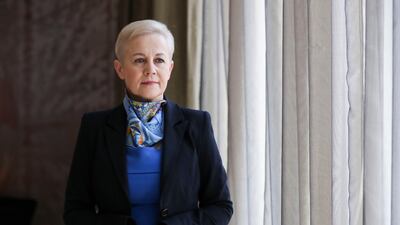Only through “open dialogue" and "understanding each other” can governments and businesses have the necessary effect on people’s well-being and quality of life to rebuild social capital and trust lost in recent years, the head of Poland’s state development bank has said.
Speaking exclusively to The National before Poland’s country day at Expo 2020 Dubai on Tuesday, Beata Daszynska-Muzyczka, president of Bank Gospodarstwa Krajowego, highlighted a shift in priorities towards sustainable economic growth and development that focuses on people rather than profit after the financial crisis and the Covid-19 pandemic.
“Everything that we're doing is linked with people, with the quality of life and we as a financial institution, as a business, entrepreneurs, we are responsible for what we are doing because it has a huge impact,” she said.
BGK is focused on encouraging businesses with which it engages to think this way and to support creating opportunities for people, especially the young. It is also working to help Poland’s exporters expand into new markets and attract investment to the country. Sustainable development is the third vital area for the bank.
“We as a financial institution, as a development institution, will have to know how to answer how to be ready to address sustainable development, in our procedures in our products, and how to encourage our customers, not only business, but also the financial institution and the banking sector … to help them to change into the sustainable development,” she said.
Ms Daszynska-Muzyczka cited the example of the Three Seas Initiative Fund and its focus on closing the €600 billion ($676.51bn) infrastructure gap in the 12 EU nations between the Adriatic, Baltic and Black seas.

It is a region that has a quarter of Europe’s population and a third of the continental land mass but its gross domestic product and economic growth lag behind.
The fund was created to support the Three Seas Initiative launched in 2015 by Poland’s President Andrzej Duda and Croatian President Kolinda Grabar-Kitarovic. It is also working to show businesses the opportunities that exist in the region rather than the traditional markets to the East and West of the 12 nations.
The fund’s track record, raising about €1bn from 10 investors so far, demonstrates the importance of making open dialogue a priority.
“Can you imagine 12 countries, 12 languages … 12 different legal requirements … we visited all our colleagues in this region individually … in many cases it was our first meeting … then regularly we have the workshops and discuss what will be the best scenario, what will be the strategy, what will be the most important legal aspects that we have to take into account. Today … we know each other better. We know what are the infrastructure gaps that we have, we better understand each other,” Ms Daszynska-Muzyczka said.
With political tension rising on Poland’s border with Belarus, between the US and Russia over Ukraine and with neighbouring Czech Republic over the continued operation of a Polish coal mine, the question of how to break through the noise to ensure investment keeps being made is difficult to answer, she conceded.
This is all part of the “new normal” of politics.
“It is a question of how this region is perceived by the Western part of the globe ... also, of course, we’ll have question marks … why did the Nord Stream II [gas pipeline] surround us? Why is the only connection [for the pipeline] between East and West? How can we survive as a central, eastern part of EU without this co-operation between ourselves and also outside of our region?”
Energy security and the energy transition are also critical areas in terms of how the region can thrive in the future.
“Today, energy means independence. Today, energy means how you can manage the country,” she said. “I had some discussion with my colleagues from Germany, from financial institutions, France, Italy, because we have regular meetings and ask them, ‘can you imagine it is possible to deliver the energy [transition] because the consuming of energy is rising constantly? Is it possible to deliver the huge amount of energy only through solar plant and wind farm? What will be the future? Nuclear?’ I don't know, if we don't want to accept nuclear plant [or] fossil fuel, including gas. So what will be the solution?”

She said this creates “mixed feelings”.
The Three Seas fund has invested in three sectors: transport and logistics, digital with data centres and renewable energy. When discussing which energy investments to make, she said natural gas was not considered to be viable but “at the same time we had to accept Nord Stream II exists”.
“Maybe hydrogen will be the fuel of the future and investing in new technology, how to store hydrogen … buses for the public transport … it is probably the future but can any experts answer [for certain the question of] ‘what will be the best choice the mix of sources to produce energy?’. Nobody knows [for sure].”


